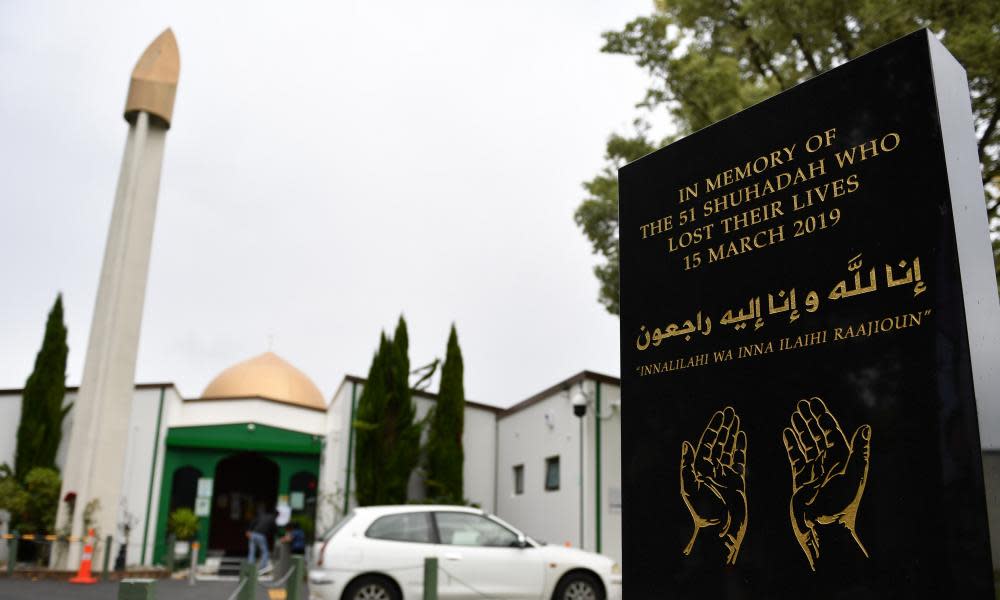Christchurch attack inquiry: coroner declines to remove lawyer after request from families

The coroner leading an inquiry into the 2019 terrorist attack on two Christchurch mosques has ruled a senior lawyer assisting her investigation will not cross-examine police witnesses or give advice on officers’ conduct, after bereaved families called for her removal over her law firm’s close work with the police.
But coroner Brigitte Windley said in a ruling published on Friday that there was no allegation of misconduct by the lawyer, Alysha McClintock, who is also a Crown prosecutor. Windley declined the families’ application to remove McClintock from the inquiry altogether, rejecting their arguments that she might face real or perceived conflicts of interest when questioning officers at an inquest.
The inquiry is New Zealand’s last formal process to investigate the massacre of 51 Muslim worshipers at prayer by an Australian white supremacist who stormed into two mosques and opened fire. It has already proved the stage for fraught and lingering questions from many of the bereaved relatives and survivors.
Related: Twitter failed to detect upload of Christchurch mosque terror attack videos
The terrorist, Brenton Tarrant, broadcast live video of his assault on social media and published an account of his racist views online. His attack prompted an outpouring of grief across the world, a ban on most semiautomatic weapons in New Zealand, and a jail term of life without the chance of parole for Tarrant, 32, who moved to New Zealand in order to secretly plan and carry out the mass shooting.
But resolving questions from the bereaved and survivors about the terrorist’s actions, and what the authorities knew and did before and immediately after the attacks, has not been simple.
Many called during the establishment of the coronial inquiry for scrutiny of the police response to the attack, including whether any lives could have been saved in the aftermath if first responders had acted differently. The subject was excluded from the parameters of the royal commission into the shooting and will be examined in detail by the coroner.
In Friday’s ruling, the coroner said the families “appear to be taking an intensely oppositional stance in relation to the issues which engage questions about police conduct” which had led them to regard the police “as litigation adversaries”.
Coronial inquiries in New Zealand are inquisitorial, not adversarial, proceedings she added.
Lawyers representing dozens of the families told Windley in October that McClintock should not act as counsel assisting the inquiry because she works for an Auckland law firm that holds the city’s Crown solicitor warrant and prosecutes cases for the police and other authorities.
One lawyer, Nigel Hampton KC, said McClintock’s removal would ensure there was “no pulling of the punches” when it came to scrutiny of police actions, a suggestion the coroner decried in Friday’s ruling.
McClintock would provide “fair, impartial and independent advice” to the inquiry, “as she has to date,” Windley wrote.
But she had exercised her discretion to amend McClintock’s role because she did not want the victims’ families “to fear that counsel assisting might be slower to criticise the police than another lawyer would,” Windley said.
Hampton said that the decision to modify McClintock’s role to exclude cross-examination of police witnesses and providing formal or informal advice on police conduct was “a positive one”. Another lawyer has been appointed to conduct that work.
A spokesperson for the 15 March Whānau Trust – a group representing 84 bereaved relatives and survivors – said he was “pleased” with the outcome.
“We don’t agree that we are taking an intensely oppositional stance,” wrote Rashid Omar, whose son, Tariq Omar, 24, was killed in the attack. “We were genuinely concerned about a lawyer, who works with the police as part of her job, advising and supporting the coroner in a case that involves review of police conduct.”
Friday’s ruling acknowledged the simmering tensions and distrust that have plagued many of the bereaved families since the 15 March 2019 attack. When Tarrant pleaded guilty to every charge he faced in March 2020, the joy that a traumatic and lengthy trial had been averted eventually gave way, for some, to discomfort that none of the evidence accumulated would be publicly aired.
The royal commission into the massacre held its inquiry entirely behind closed doors before producing an 800-page report in December 2020. It concluded the shooting could not have been prevented by any New Zealand authorities “except by chance”.
The lack of opportunities for the survivors and bereaved families to scrutinise evidence and question officials in earlier proceedings has increased expectations – and urgency – about the coronial inquiry. It will examine the circumstances of the 51 deaths – including questions about the role of social media in Tarrant’s radicalisation – and may result in recommendations from the coroner.
Aarif Rasheed, a lawyer for a number of the families, said in October submissions for McClintock’s removal that his clients’ mistrust of the process was prompted not only by the trauma they had suffered but by their negative experiences with police and security services in the years before the attack.
The inquiry is due to hold its first public inquest in May 2023. Its preparation continues despite an application last month by Tarrant to appeal his convictions and sentence of life in prison without parole.
In an application to the court of appeal viewed by the Guardian this month, Tarrant wrote that he had pleaded guilty to 51 counts of murder, 40 of attempted murder and a terrorism charge under duress from torture. He did not provide further explanation of the one-sentence claim, and said he was not represented by a lawyer.
The court of appeal must decide whether to consider his application because it was made more than two years after the legally permitted period for challenging a conviction. A ruling is awaited.

 Yahoo Movies
Yahoo Movies 
